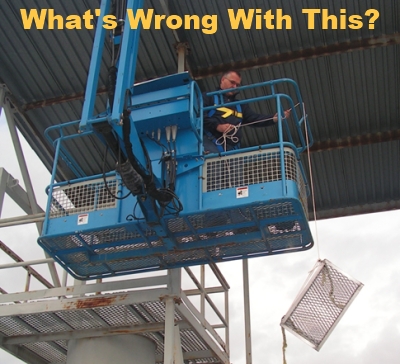Happy 2013! We hope you had a great holiday season. If you’re suffering from post-holiday blues, cheer up, January might not have the most notable holidays but it certainly has some interesting ones, like…
Jan 3: Fruitcake Toss Day
Jan 8: National Bubble Bath Day
Jan 10: Peculiar People Day
Jan 13: International Skeptics Day
Jan 14: Dress Up Your Pet Day
Jan 17: Ditch New Years Resolutions Day
Jan 18: Thesaurus Day
Jan 19: National Popcorn Day
Jan 20: Penguin Awareness Day
Jan 21: Squirrel Appreciation Day
Jan 23: National Rhubarb Pie Day
Jan 24: Beer Can Appreciation Day
Jan 28: National Kazoo Day
Jan 30: National Inane Answering Message Day
Jan 31: Backwards Day
To all you counterbalanced and rough terrain forklift trainers: our newly revised operator training materials are now available for purchase! You can download updated answer keys on the IVES Member Dashboard.
Ask Bob
 I have been asked to recertify a bunch of guys who do not have their original operator documentation. Is this OK or do I need to have them attend an operator certification program?
I have been asked to recertify a bunch of guys who do not have their original operator documentation. Is this OK or do I need to have them attend an operator certification program?
If you did not initially train the operators in question then you need to establish if they have received the required training. The only way to establish prior training is to see their initial certification documentation. If they cannot prove that initial certification has taken place then the recertification training will not mean a thing.
If you did provide the initial training and/or they can provide you with documentation proving that training did take place and that they successfully completed it, then it is just a case of running them through a refresher course.
What’s Wrong With This?
See if you can spot what’s going wrong in the photo below. We’ll share the answer in February’s Update.

Answer To Last Month’s WWWT?
In December’s What’s Wrong With This? the aerial work platform (scissor lift) being used did not have all the outriggers properly set in place, which could make the lift unstable.
OSHA’s Top 10
Here are OSHA’s top 10 most cited violations for last year (October 2011 – September 30, 2012) in comparison to the previous year. Cited violations are down across the board, but fall protection is, once again, the number one most cited violation in the USA. Come on, people – put those harnesses and lanyards on already!
| 2012 Rank |
Violation Type |
2012 Violations |
2011 Rank |
2011 Violations |
| #1 |
Fall protection |
7,250 |
#1 |
7,139 |
| #2 |
Hazard Communication |
4,696 |
#3 |
6,538 |
| #3 |
Scaffolding |
3,814 |
#2 |
7,069 |
| #4 |
Respiratory Protection |
2,371 |
#4 |
3,944 |
| #5 |
Ladders |
2,310 |
#8 |
3,244 |
| #6 |
Machinery & Machine Guarding |
2,097 |
#10 |
2,728 |
| #7 |
Powered Industrial Trucks |
1,993 |
#7 |
3,432 |
| #8 |
Electrical – Wiring Methods |
1,744 |
#6 |
3,584 |
| #9 |
Lockout/Tagout |
1,572 |
#5 |
3,639 |
| #10 |
Electrical – General Requirements |
1,332 |
#9 |
2,863 |
New Digital Training Aid *Internet Version*
Our newest DTA is internet based, so it is viewable from your browser! After purchase, this product is available to use through the IVES Member Dashboard – it isn’t downloaded to your computer. Product available for counterbalanced forklift, aerial boomlift, scissor lift, combined aerial lifts and excavator.
New Trainer Support Documents Available
We have added a dozen downloadable documents, available for FREE on our Member Dashboard! We hope you find them helpful. Here’s a brief description of each:
- SUP-043 Site and Equipment Specifics: Use this document to tour your worksite and record any information on hazards, special operating conditions, loads and load handling, lifting attachments, machine specifics, etc. That information will help you to customize your operator training programs to suit your specific conditions and equipment.
- SUP-069 OSH Checklist: This Occupational Safety and Health Checklist contains a comprehensive list of safety related items that every company should be doing. Download yours today and see how your company stacks up.
- SUP-070 Fed OSHA PIT Regulations: This is US CFR29 1910.178(l) Powered Industrial Truck Operator Training Standard. Download a copy and leave some prints in the lunchroom at your workplace or hand them out on operator training programs for reference.
- SUP-072 WA PIT Regulations: An excerpt from the Washington Industrial Safety & Health Act (WISHA), Chapter 296-863, Forklifts and other Powered Industrial Trucks (PITs).
- SUP-073 OR PIT Regulations: An excerpt of the Oregon Administrative Rules, Powered Industrial Trucks Part N. This document is specific to Oregon and generally mirrors the Federal OSHA requirements, but also includes regulations that exceed the federal regulations.
- SUP-074 CA PIT Regulations: Subchapter 7. General Industrial Safety Orders, Group 4, General Mobile Equipment and Auxiliaries. Article 25. Industrial Trucks, Tractors, Haulage Vehicles and Earthmoving Equipment. This regulatory excerpt is specific to California and is worth having since California regulation exceeds the state mandate in many areas.
- SUP-075 Safety Matters – Forklift Designations: This document lists the 11 type designations of the National Fire Protection Association (NFPA) in relation the fire hazard ratings of powered industrial equipment. If your company operates powered industrial equipment in high fire hazard locations (like where there are explosive airborne materials) this document will be of interest to you.
- SUP-077 Safety Matters – OSHA Seatbelt Interpretation: This document provides details on OSHA’s expectations of forklift users and provides the reference information it uses in enforcing the use of seatbelts.
- SUP-078 Safety Matters – Forklift Attachment Abbreviations: A list of abbreviations for common forklift lifting attachments that can help trainers decipher the data plate information of the machines they use, as well as providing standardized terminology to use when completing documentation.
- SUP-084 WorkSafeBC Guideline: A Guideline for Section 16.7(j) of the British Columbia Occupational Health and Safety Regulation which mandates compliance with CSA Standard B335-94: Lift Truck Operator Training. This document details WorkSafeBC’s interpretation of the CSA standard(s) referenced by the regulation and provides explanatory information on application of the standard.
- SUP-085 WorkSafeBC Regulatory Excerpt: This document contains all of the applicable regulations to using and training operators of forklifts, aerial lifts, loaders and cranes as well as some general regulations addressing rights and responsibilities, definitions, general requirements, PPE, etc.
- SUP-086 Due Diligence Checklist: Courtesy of WorkSafeBC, this checklist contains a comprehensive list of safety related items that every company should be doing.
Go to the IVES Member Dashboard to download these documents FREE OF CHARGE!
Busted!
KENTON, Ohio – The U.S. Department of Labor’s Occupational Safety and Health Administration has cited a company in Kenton with five safety violations after a worker was injured when struck by a forklift. The September complaint inspection has resulted in proposed penalties totaling $89,000.
“Employers are responsible for ensuring workers are properly trained in the operation of equipment and that equipment, such as forklifts, are maintained in good working order,” said Kim Nelson, area director for OSHA in Toledo.
A willful violation was cited for failing to remove unsafe forklifts from service. A willful violation is one commit ted with intentional knowing or voluntary disregard for the law’s requirements, or with plain indifference to worker safety and health.
Three serious violations were cited for failing to complete forklift inspections, retrain workers in forklift operations following an incident where an injury occurred and operate a forklift in a safe manner. A serious violation occurs when there is substantial probability that death or serious physical harm could result from a hazard about which the employer knew or should have known.
The company also has been cited with one other-than-serious violation for failing to have name and capacity plates on forklifts. An other-than-serious violation is one that has a direct relationship to job safety and health, but probably would not cause death or serious physical harm.
Source: OSHA
Upcoming Events
- April 22-23. 2013 Western Conference on Safety in Vancouver, BC.
- May 7-10. Region VI VPPPA Chapter Conference in San Antonio, TX.
- June 24-26. ASSE 2013 Annual Conference & Exposition in Las Vegas, NV.
- August 26-29. 29th Annual National VPPPA Conference in Nashville, TN.
Did you enjoy this newsletter? Sign up for our newsletter to receive more like this!